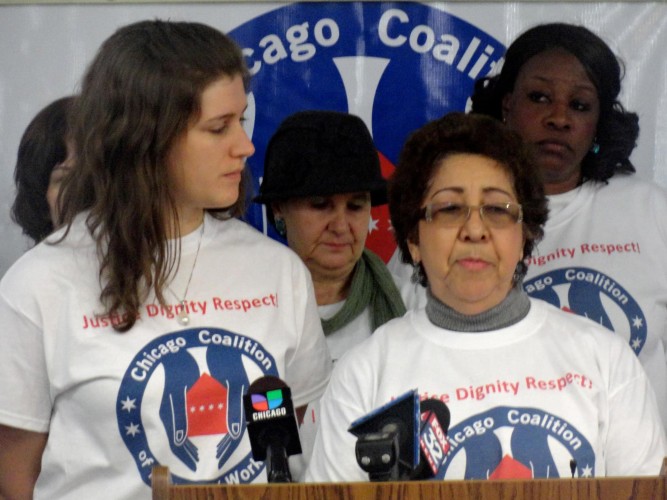A new study from the University of Illinois at Chicago shows domestic workers experience low pay, lack of benefits, abuse and hazardous working conditions. The groundbreaking results were announced today by a domestic workers advocacy group.
The study surveyed more than 2,000 nannies, house cleaners and caregivers in 14 cities, including Chicago. Conducted by the National Domestic Workers Alliance, the study for the first times paints a portrait of what it is like to be a domestic worker in the United States.
See our other stories on Labor issues in Chicago.
Domestic workers abused verbally, physically and psychologically and often are paid too low, said Beth Gutelins, a researcher at University of Illinois at Chicago
Digna Morales, a domestic worker for a household with two young children, said she worked for $3.50 per hour. She was fired after refusing to accept a sexual offer in exchange for a $1 per hour raise, she said.

Twenty-three percent of workers are paid under minimum wage, according to the study. Gutelins said domestic workers say 40 hours a week to start, but over time those hours are stretched out and their overall pay ends up being less than minimum wage.
The National Labor Relations Act bans domestic workers from forming unions or bargaining. According to the Occupational Safety and Health Act, US workers are protected over from backlash if they speak out on mistreatment from their employers.
In 2011, an Illinois Domestic Workers Bill of Rights was introduced to Illinois legislature. Under this bill, domestic workers would have enjoyed the protection from employer discrimination under the Illinois Human Rights Act.
Workers would also be entitled to at least 24 hours of rest each work-week and are entitled to state minimum wages, which is $8.25 per hour. The bill was defeated 35 to 19 votes.
Many domestic workers do not report these abuses because they are undocumented workers who fear being deported or have no other means to support themselves, according to the study.
“There is nothing else you can really do other than leave,” said Mryla Baldonado, a former caregiver who now works for the Chicago Coalition of Domestic Workers. “But I had to stay because I needed to work and support myself.”
Baldonado had 20 clients and experienced the same verbal abuse, and neglect from her clients in the suburbs of Chicago.
Baldonado has four adopted children that she supported which left nothing to support getting any form of healthcare for herself.
Baldonado earned $1,760 per month and it equaled out to $4.50 an hour during her last position as a caregiver. Baldonado worked 24 hours a day and up to more than 96 hours a week if she was told to.
Baldonado didn’t ask for a pay increase because of the rules that were set in the particular household that she was working, “If you don’t like the way a client treats you, you have to leave,” said Baldonado.
“There is nothing else you can really do other than leave. But I had to stay because I needed to work and support myself.” She said.
Baldonado recalled a particular family that she experienced verbal abuse. Her boss made a comment regarding her language barrier. Filipino is her first language while English remains her second.
“It was very abusive because you enter a private space, and there is no contract so they can make whatever rules they want to,” she said.
“One time he told me ‘I don’t care if you speak Japanese, Filipino or English, this is something a 5 year old can do’.”
About 41 percent of domestic workers either speak very little English or no English at all. Anna Jakubek, Polish Community Organizer for Arise Chicago, said the language barriers affects their ability to negotiate a fair contract with their employer
“If they do speak English properly, the contract they are about to get is not proper,” Jakubek said. “They are not able to communicate for themselves from the very beginning. Some people really take advantage of that.
Lisa Thomas is a domestic worker and an organizer for Chicago Coalition for Domestic Workers. She’s been working for over 25 years, all over the city and said she has experienced abuse first hand caring for elderly people.
“I worked for this one Polish lady who was on oxygen most of the time,” Thomas said. “I would get there first thing in the morning and clean her room, bathe her, change her sheets while her son called me a ‘dirty black bitch’ all day long.”
Thomas also said that on a separate occasion she rushed to the house after frantic calls from the Polish woman to find her son at the top of the stairs with a bat, threatening to “beat her black ass.”
“I told him, ‘if you hit me how am I going to take care of your mother?’” Thomas said. “I stayed as long as I could stay because she wanted me to, but I couldn’t take it after a year.”
According to Thomas she knows several other workers who go through similar problems. Including one particular woman who is an illegal immigrant.
“This girl is living in fear every day,” said Thomas. “Her boss [the husband] is forcing her to sleep with him, her quarters are a mattress in front of the washer and dryer, and she can’t eat or anything until everyone else- including the dog- eats. On top of that she only makes $2.25 an hour. She’s too afraid to speak because she does not want to get deported.”
The report recommends that domestic workers should be included in employment and labor laws and employers should educate themselves on workers’ rights.
Trevor Greig, Jessica Lang, Brian Tabick and Eva Quiñones contributed reporting.













Be First to Comment